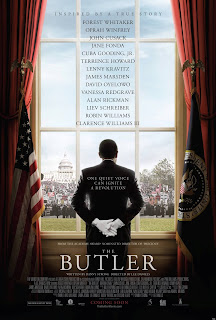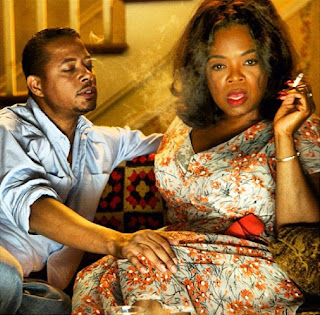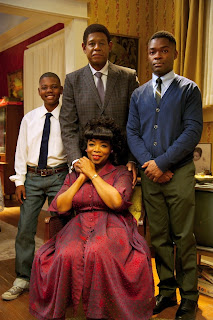 |
| Lee Daniels’ The Butler |
Written by Erin Tatum.
My experience going to see Lee Daniels’ The Butler made an impression on me even before the film started playing. I don’t think I have ever been to a movie where every single preview featured a protagonist of color. It reminded me just how whitewashed Hollywood is. Why are films about people of color only marketed through the platform of other films whose primary audience is anticipated to be people of color? Maybe I’m naive – I had forgotten how big of a factor racial demographics are for advertising. All of the previews were spectacular and left me wanting to see more. It’s a shame that these gems don’t get more publicity.
Lee Daniels’ The Butler is a tall order to say the least: it runs a staggering 132 minutes and spans eight presidential administrations with an all-star cast including Forest Whitaker, Oprah Winfrey, Mariah Carey (blink and you’ll miss her), David Oyelowo, Terrence Howard, and Cuba Gooding Jr., just to name a few. It’s to the point where one article calls the film a “cameo roulette.” The amount of history covered is absolutely breathtaking in scope. The script can feel uneven at times because of this, especially in the beginning. You might spend 20 minutes in one year and then cover the next five years in 10 minutes. I applaud the tenacity of the casting director, as I don’t think I’ve ever seen so many cast changes to reflect characters aging. Of course it is a little ridiculous that 52-year-old Forest Whitaker plays Cecil from approximately age 25 into his 90s, but the magic of makeup does wonders. The attention to detail in this film is meticulous, from the clothing to the decor to the hairstyles. The differences and subtleties of each presidential personality are also captured thoroughly even if briefly. There is even a particularly funny scene where Dwight Eisenhower gruffly asks Cecil for… toilet paper assistance… as his beagles sit loyally by the toilet.
 |
| Cecil and Gloria. |
At its core, the film chronicles the cross-generational struggle to define black identity and masculinity in a racist American society. Little Cecil learns that subservience is the best policy after his father is shot dead for uttering a simple monotone “hey” at the ruthless cotton farm owner, Thomas (Alex Pettyfer), who had likely just raped his mother. Thomas’ elderly mother (Vanessa Redgrave) takes pity on Cecil and allows him to become a domestic servant, where he quickly adapts to being neither seen nor heard. These skills come in handy when he leaves the South and begins serving wealthy white clientele at various DC hotels, leading to his recruitment as a White House butler. Before starting the job, he is reminded that “there are no politics in the White House.” He thus resolves to continue to be painstakingly neutral on any potential political conflict, even if he is explicitly asked for his opinion. His commitment to his career soon borders on obsessive as he works long days and nights, leaving his marriage to wife Gloria (Winfrey) in a perpetual state of decay. Although he watches her battle alcoholism and strongly suspects her affair with the neighbor, Cecil’s commitment to family values and tradition never wavers.
 |
| Gloria is unhappy and has an affair. |
Cecil’s attitude of racial uplift through hard work starkly contrasts to the restlessness of his older son Lewis (Oyelowo). He is shown to be scornful of and perhaps embarrassed by his father’s position from the time he is a teenager, a disconnect that is all the more exacerbated when he begins to participate in nonviolent civil rights protests while in college. The scenes of the diner sit-in and the Freedom Rides are some of the most emotionally resonant of the film. You can actually feel the burning hatred of their attackers and a few well-timed close-ups ensure that you’re up close and personal to some of their most inhumane and humiliating tactics. One girl has ketchup smeared on her face. Lewis has hot coffee thrown in his eyes. On that note, I’ve never been more disgusted by saliva. You watch one of the attackers lean in and spit a loogie on the cheek of one of the girls protesting and it is vile. Lewis continues to participate in the civil rights efforts despite multiple arrests, much to his parents’ chagrin. Cecil remarks that he “doesn’t understand how Lewis can’t see that the president is going to make things better for us,” particularly after witnessing slow but steady changes in racial policy.
 |
| Cecil and Gloria with Lewis (right) and Charlie (left) |
What we are witnessing here is friction in the generation gap over ideas about the best means to achieve racial uplift. Cecil espouses the belief in assimilation through passivity and diligence. He grew up in an era where discrimination was benign and silence was survival. In contrast, Lewis believes that discrimination means disrespect and silence equates to, dare I say, emasculation. When Lewis’ generation came of age in the 60s, what was really at stake was the question of the reputation and respectability of black masculinity. Cecil views his way of life as making the best of the limited parameters available for the fulfillment of black manhood, whereas Lewis perceives such servitude as a shameful complacency with histories of racial power dynamics and as an insult to black integrity. In what is arguably one of the most dramatic moments of the film, Cecil snaps on Lewis and his hippie girlfriend Carol (Yaya Alafia) essentially for being apathetic flower children with no respect for the sacrifices of their parents, prompting Lewis to call him an Uncle Tom. This insult provokes an epic slap from Gloria and I must say Oprah has one hell of a backhand. The freeze between father and son becomes permanent and only deepens after Lewis fails to attend his younger brother Charlie’s funeral following his death in the Vietnam War.
 |
| Cecil confronts Lewis after he is first sentenced to jail. |
Inevitably, the ideological rifts between them soften over the decades. Cecil finally gets the recognition he deserves when he successfully advocates for equal compensation and promotion opportunities for black White House employees during the Reagan Administration (it’s appalling that it took that long). The Reagans invite him and Gloria to the state dinner as guests, but something isn’t sitting right with Cecil and he finds himself increasingly dissatisfied with his job. He decides to patch things up with Lewis and joins him in protesting the imprisonment of Mandela, even getting a taste of Lewis’ life by being arrested and briefly incarcerated. As an old man, Cecil retrospectively feels a great sense of pride for Lewis’ contributions to the civil rights and black power movement. Masculinity is therefore reaffirmed as having the persistence to make your mark on society in the face of great adversity.
Things come full circle as Cecil and Gloria eagerly campaign for the election of Obama in 2008. Gloria passes away, leaving Lewis as Cecil’s last surviving family. Father and son watch the election results with tears in their eyes. Cecil is invited to meet the new president and is warmly greeted by the butler, who is also an African-American man. As Cecil walks stiffly but proudly to meet Obama, there is a definitive sense of collective triumph. Eight decades later, black masculinity is allegedly getting the respect it deserves. Although masculine privilege remains unquestioned and racial dynamics will always be a work in progress, the poignancy of the ending does bring a smile to your face.

Wow, this is a very interesting article. I just finished watching “The Women of Qumar.” I found it to be a very inspiring but also very disheartening episode. I love the character of C.J. Cregg and I think she is probably the strongest female character in the West Wing. However, I do agree with a lot of what you are saying.
I find that many times issues of feminism are belittled and brushed off in mainstream society. Feminism is seen as something that only a women could and should be interested in which is not true. There were definitely flaws in this episode but I think it also plays an important role in trying to end the perception of gender oppression as something not worth out attention.